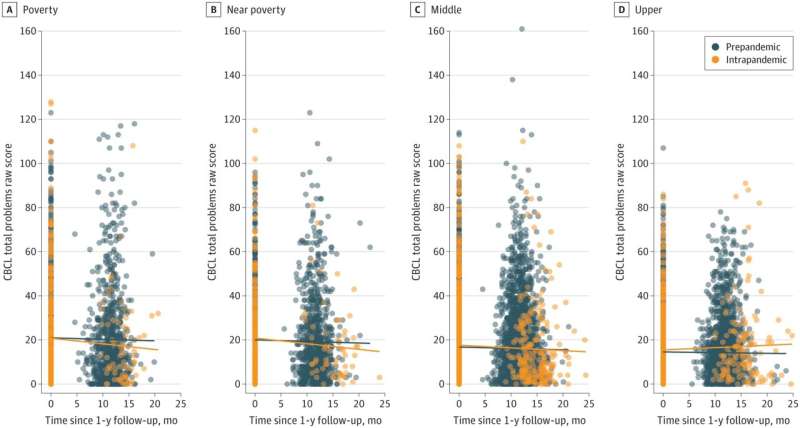This article has been reviewed according to Science X's editorial process and policies. Editors have highlighted the following attributes while ensuring the content's credibility:
fact-checked
peer-reviewed publication
trusted source
proofread
Mental health of lower-income adolescents better than that of wealthier teens during COVID-19 lockdown

Adolescence is a crucial developmental period in which the risk of mental health problems can first emerge. But for millions of youths, that sensitive time period coincided with the social isolation of COVID-19 and remote schooling.
Research suggests that the stresses and associated isolation of the pandemic may have worsened emotional and behavioral health among youth. But until recently, nobody had looked at pandemic-related mental health effects by income level.
Hypothesizing that the near total social isolation caused by pandemic restrictions would affect youth from lower income families more than their wealthier peers, a team of researchers at Children's Hospital Los Angeles used the pandemic shutdown as a "natural experiment."
They followed the mental health outcomes of 10,399 youth between 10 and 12 years old already enrolled in the ongoing multisite, 10-year Adolescent Brain Cognitive Development (ABCD) Study. Their results were recently published in JAMA Network Open.
The researchers analyzed data from 10,171 youth followed for one year, and 10,399 youth with 2-year follow-up data. They determined the adolescents' socio-economic status by calculating families' "income-to-needs ratio," or how much money available per person in the household according to the 2017 federal poverty guidelines.
They found that adolescents whose families were associated with higher socioeconomic status—just 1 unit higher on the income-to-needs ratio scale—reported disproportionately worse mental health symptoms including greater depression, anxiety and more total problems over time.
"We know that COVID disproportionately affected individuals from lower income households, and we were expecting this would also have an exacerbated effect on the mental health of kids from these households," says Shana Adise, Ph.D., Investigator, Division of Endocrinology, Diabetes, and Metabolism, and first author of the study, collaborating with the laboratory of Elizabeth Sowell, Ph.D., Division of Neurology.
"We were surprised to find quite the opposite, that the kids from higher income families were the ones most affected by mental health problems during COVID. We've seen in other studies that we've published that the groups at poverty or near-poverty level responded differently during COVID. There could be a level of cultural or community adaptation among these families that the higher and middle-income families did not have."
What the research team measured
Of the study participants, 52% were male; 20% were Latinx/Hispanic and 66% were white; 44% reported caregivers had less education than a 4-year college degree; and 26% had an income-to-needs ratio below or just above poverty level. The researchers investigated mental health symptoms using the Child Behavior Checklist, which asks caregivers about their children's mental health symptoms; and the Family Environmental Scale, which examines youth-perceived conflict in the home.
"The ABCD study wasn't really designed to assess interpersonal relationships," says Dr. Adise. "We know, however, that for most average Americans, that COVID created more conflict among a lot of families. But youth-reported conflict levels didn't explain the differences in mental health outcomes reported by their caregivers in the study.
"It would be interesting to look at whether this continues to have a profound, long-lasting effect among these groups. We know from the individuals who were affected by the COVID pandemic lockdown, that kids need extra support. But those financial measures have been used up.
"I think this study highlights that we still need to make sure that mental health services are still there to help kids who are suffering anxious, depressed behaviors through adolescence."
More information: Shana Adise et al, Socioeconomic Disadvantage and Youth Mental Health During the COVID-19 Pandemic Lockdown, JAMA Network Open (2024). DOI: 10.1001/jamanetworkopen.2024.20466


















